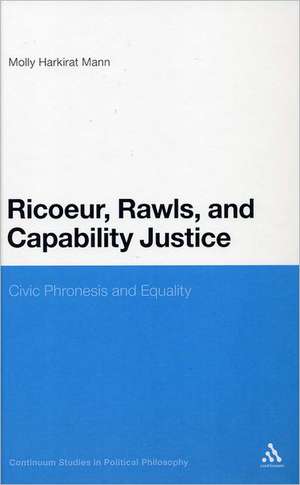Ricoeur, Rawls, and Capability Justice: Civic Phronesis and Equality : Continuum Studies in Political Philosophy
Autor Professor Molly Harkirat Mannen Limba Engleză Hardback – 8 feb 2012
| Toate formatele și edițiile | Preț | Express |
|---|---|---|
| Paperback (1) | 257.12 lei 6-8 săpt. | |
| Bloomsbury Publishing – 20 noi 2013 | 257.12 lei 6-8 săpt. | |
| Hardback (1) | 890.28 lei 6-8 săpt. | |
| Bloomsbury Publishing – 8 feb 2012 | 890.28 lei 6-8 săpt. |
Preț: 890.28 lei
Preț vechi: 1282.26 lei
-31% Nou
Puncte Express: 1335
Preț estimativ în valută:
170.36€ • 182.17$ • 142.04£
170.36€ • 182.17$ • 142.04£
Carte tipărită la comandă
Livrare economică 17 aprilie-01 mai
Preluare comenzi: 021 569.72.76
Specificații
ISBN-13: 9781441198501
ISBN-10: 1441198504
Pagini: 240
Dimensiuni: 156 x 234 x 23 mm
Greutate: 0.5 kg
Ediția:New.
Editura: Bloomsbury Publishing
Colecția Continuum
Seria Continuum Studies in Political Philosophy
Locul publicării:London, United Kingdom
ISBN-10: 1441198504
Pagini: 240
Dimensiuni: 156 x 234 x 23 mm
Greutate: 0.5 kg
Ediția:New.
Editura: Bloomsbury Publishing
Colecția Continuum
Seria Continuum Studies in Political Philosophy
Locul publicării:London, United Kingdom
Caracteristici
An improved understanding of the consequences of maintaining a divide between recognition and redistributive justice
Notă biografică
Molly Harkirat Mann is Adjunct Professor and Visiting Scholar at DePaul University, USA.
Cuprins
Acknowledgments\ Introduction: The Course of Recognitive Phronesis: Ricoeur's Response to the Moralization of Inequality \ 1.An Introduction to Ricoeur's Theory of Capability Justice \ 2. The Redistribution-Recognition Debate Revisited: The Ethical Intention in Redistributive Justice \ 3. The Sacrificial Ethics of Constitutive Communitarianism \ 4. Civic Phronesis: Rawls's Anti-Sacrificial Ethics for Capability Justice \ 5. Hegel's Philosophical-Historical Account of the Modern Interventionist State:The Social Figuration of Right \ 6. The De-Penalization of Responsibility: A Genealogy of Enfranchisement in the Modern Welfare State \ Notes \ Bibliography\ Index
Recenzii
We begin with we are, not I am. We are who we are because of what we do through our daily practices. At a time when the United States has led the return to the gilded age when 1% of the population own one-third of its wealth, when those in the financial services who contribute least to the production of that wealth join the .com innovators to predominate among the super rich, when protesters claiming to represent the other 99% seek to reverse the direction of the narrative of greed that began in the 1980s to rise to its current pre-eminence, when protests that started on Wall Street have spread worldwide,when the principles to counteract the moralization of greed and inequality are in greatest need, this book's superb philosophical examination of that moral struggle could not be more timely.
Ricoeur, Rawls and Capability Justice will surely deserve its place among first-rate scholarly works on social justice, compassion and welfare. Its close reading of Rawls through Aristotle and Ricoeur on the inclusion of the least advantaged citizen is admirably patient and persuasive. Readers will be especially intrigued by the concluding argument on the reduction of poverty and crime as civic rather than police policy.
In this incisive work, Molly Harkirat Mann builds upon and deepens the work of Paul Ricoeur to argue that Rawls' theory of distributive justice, typically considered anti-communitarian, in fact supports a defense of the mutual society. This is a vital book in its response to our increasingly individualistic times.
Ricoeur, Rawls and Capability Justice will surely deserve its place among first-rate scholarly works on social justice, compassion and welfare. Its close reading of Rawls through Aristotle and Ricoeur on the inclusion of the least advantaged citizen is admirably patient and persuasive. Readers will be especially intrigued by the concluding argument on the reduction of poverty and crime as civic rather than police policy.
In this incisive work, Molly Harkirat Mann builds upon and deepens the work of Paul Ricoeur to argue that Rawls' theory of distributive justice, typically considered anti-communitarian, in fact supports a defense of the mutual society. This is a vital book in its response to our increasingly individualistic times.

























